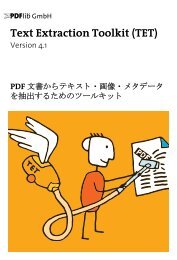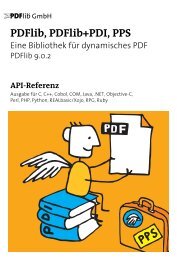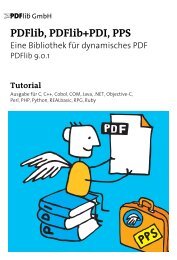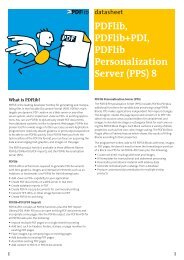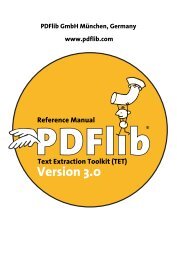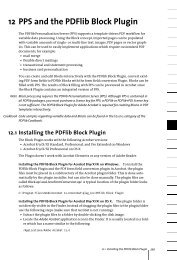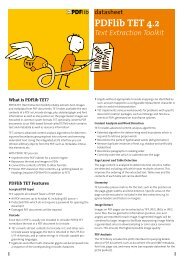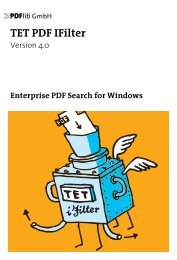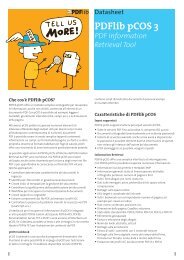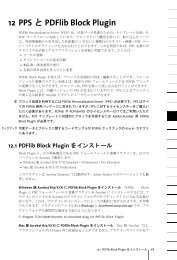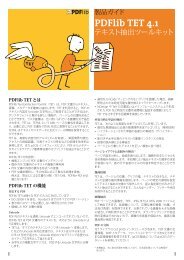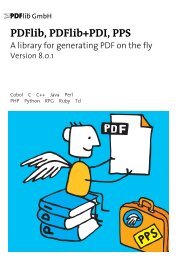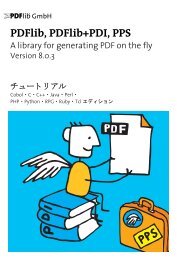PDFlib 8 Windows COM/.NET Tutorial
PDFlib 8 Windows COM/.NET Tutorial
PDFlib 8 Windows COM/.NET Tutorial
Create successful ePaper yourself
Turn your PDF publications into a flip-book with our unique Google optimized e-Paper software.
1 Introduction<br />
1.1 Roadmap to Documentation and Samples<br />
We provide the material listed below to assist you in using <strong>PDFlib</strong> products successfully.<br />
Note On <strong>Windows</strong> Vista and <strong>Windows</strong> 7 the mini samples and starter samples will be installed in the<br />
»Program Files« directory by default. Due to the <strong>Windows</strong> protection scheme the PDF output<br />
files created by these samples will only be visible under »compatibility files«. Recommended<br />
workaround: copy the folder with the samples to a user directory.<br />
Mini samples for all language bindings. The mini samples (hello, image, pdfclock, etc.)<br />
are available in all packages and for all language bindings. They provide minimalistic<br />
sample code for text output, images, and vector graphics. The mini samples are mainly<br />
useful for testing your <strong>PDFlib</strong> installation, and for getting a very quick overview of writing<br />
<strong>PDFlib</strong> applications.<br />
Starter samples for all language bindings. The starter samples are contained in all<br />
packages and are available for a variety of language bindings. They provide a useful generic<br />
starting point for important topics, and cover simple text and image output, Textflow<br />
and table formatting, PDF/A and PDF/X creation and many other topics. The starter<br />
samples demonstrate basic techniques for achieving a particular goal with <strong>PDFlib</strong> products.<br />
It is strongly recommended to take a look at the starter samples.<br />
<strong>PDFlib</strong> <strong>Tutorial</strong>. The <strong>PDFlib</strong> <strong>Tutorial</strong> (this manual), which is contained in all packages as<br />
a single PDF document, explains important programming concepts in more detail, including<br />
small pieces of sample code. If you start extending your code beyond the starter<br />
samples you should read up on relevant topics in the <strong>PDFlib</strong> <strong>Tutorial</strong>.<br />
Note Most examples in this <strong>PDFlib</strong> <strong>Tutorial</strong> are provided in the Java language (except for the<br />
language-specific samples in Chapter 2, »<strong>PDFlib</strong> Language Bindings«, page 27, and a few C-<br />
specific samples which are marked as such). Although syntax details vary with each language,<br />
the basic concepts of <strong>PDFlib</strong> programming are the same for all language bindings.<br />
<strong>PDFlib</strong> API Reference. The <strong>PDFlib</strong> API Reference, which is contained in all packages as a<br />
single PDF document, contains a concise description of all functions, parameters, and<br />
options which together comprise the <strong>PDFlib</strong> application programming interface (API).<br />
The <strong>PDFlib</strong> API Reference is the definitive source for looking up parameter details, supported<br />
options, input conditions, and other programming rules which must be observed.<br />
Note that some other reference documents are incomplete, e.g. the Javadoc API<br />
listing for <strong>PDFlib</strong> and the <strong>PDFlib</strong> function listing on php.net. Make sure to always use the<br />
full <strong>PDFlib</strong> API Reference when working with <strong>PDFlib</strong>.<br />
pCOS Path Reference. The pCOS interface can be used to query a variety of properties<br />
from PDF documents. pCOS is included in <strong>PDFlib</strong>+PDI and PPS. The pCOS Path Reference<br />
contains a description of the path syntax used to address individual objects within a<br />
PDF document in order to retrieve the corresponding values.<br />
1.1 Roadmap to Documentation and Samples 13



